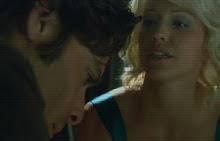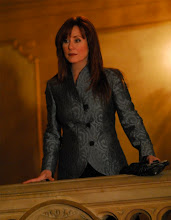 audience will get to decide." [Groan] Moore is quoted by Maureen Ryan of the Chicago Tribune as confirming that no one pictured in the BSG Last Supper image is the final Cylon. Olmos says that the story ends in a very dark place, the survivors end u
audience will get to decide." [Groan] Moore is quoted by Maureen Ryan of the Chicago Tribune as confirming that no one pictured in the BSG Last Supper image is the final Cylon. Olmos says that the story ends in a very dark place, the survivors end u p with almost nothing.
p with almost nothing. With regard to the Fifth and final Cylon, if none of the people pictured in the Last Supper image is it, that leaves a minor character or a character we have not yet met. Since introducing a major character in the Third Act that figures in the ending of a story violates a fundame ntal tenet of screenwriting I'll assume instead that a minor character we already know is destined to be revealed as the Fifth. Doc Cottle anyone?
ntal tenet of screenwriting I'll assume instead that a minor character we already know is destined to be revealed as the Fifth. Doc Cottle anyone?
 ntal tenet of screenwriting I'll assume instead that a minor character we already know is destined to be revealed as the Fifth. Doc Cottle anyone?
ntal tenet of screenwriting I'll assume instead that a minor character we already know is destined to be revealed as the Fifth. Doc Cottle anyone? On my other blog, BSG Last Supper, I explore the possibilities. Dualla, due to her character's family history with the Adamas in the new Caprica series, seems to have the inside track (a weak choice in my view), and they did the big Gaeta-dangle in Guess What's Co ming to Dinner, so he seems in second place. Why the Fifth would be the last to become self-aware bears some serious explaining, but since the show is on a furious pace to wrap-it-up I fear it will be glossed over or get short shrift.
ming to Dinner, so he seems in second place. Why the Fifth would be the last to become self-aware bears some serious explaining, but since the show is on a furious pace to wrap-it-up I fear it will be glossed over or get short shrift.
 ming to Dinner, so he seems in second place. Why the Fifth would be the last to become self-aware bears some serious explaining, but since the show is on a furious pace to wrap-it-up I fear it will be glossed over or get short shrift.
ming to Dinner, so he seems in second place. Why the Fifth would be the last to become self-aware bears some serious explaining, but since the show is on a furious pace to wrap-it-up I fear it will be glossed over or get short shrift. In the 60s and 70s we had the emergence of the anti-hero as a staple of modern storytelling, and this has continued with the addition of snarky irony and bait-and-switch villain-goodguy moralizing mirroring (who's really the good guy anyway?), and what I like to call calculated withholding - setting u p story drama yet never giving the payoff.
p story drama yet never giving the payoff.
Story structure that works has been understood since at least as far back as the ancient Greeks if not thousands of years earlier with triba l storytellers on the African plain. But these days so many stories, and particularly in film, we get arrested story arcs, pretentious discordance and juxtaposition that is merely artifice, and dangled story threads that go nowhere or to unsatisfying conclusions. We are getting atmospherics that not only are intended to add dimension to the story but which are tasked with actually holding up
l storytellers on the African plain. But these days so many stories, and particularly in film, we get arrested story arcs, pretentious discordance and juxtaposition that is merely artifice, and dangled story threads that go nowhere or to unsatisfying conclusions. We are getting atmospherics that not only are intended to add dimension to the story but which are tasked with actually holding up the story in places. Atmosphere cannot do that.
the story in places. Atmosphere cannot do that.
 p story drama yet never giving the payoff.
p story drama yet never giving the payoff.Story structure that works has been understood since at least as far back as the ancient Greeks if not thousands of years earlier with triba
 l storytellers on the African plain. But these days so many stories, and particularly in film, we get arrested story arcs, pretentious discordance and juxtaposition that is merely artifice, and dangled story threads that go nowhere or to unsatisfying conclusions. We are getting atmospherics that not only are intended to add dimension to the story but which are tasked with actually holding up
l storytellers on the African plain. But these days so many stories, and particularly in film, we get arrested story arcs, pretentious discordance and juxtaposition that is merely artifice, and dangled story threads that go nowhere or to unsatisfying conclusions. We are getting atmospherics that not only are intended to add dimension to the story but which are tasked with actually holding up the story in places. Atmosphere cannot do that.
the story in places. Atmosphere cannot do that.  To compare it to modern art, what we're getting are stories that resemble cubist Picassos
To compare it to modern art, what we're getting are stories that resemble cubist Picassos and jumbled Pollacks.
and jumbled Pollacks. Dalis would be okay because to make what is a narrative surreal does not detract from the narrative. Cubism and splattering paint does not provide a narrative or it is so unclear as to be a weak narrative that invites debate. Strong stories need a strong spine and and an internal logi c. Especially stori
c. Especially stori es that seek to provide a moral lesson, which early storytelling did and which Battlestar Galactica in this incarnation seems set upon doing.
es that seek to provide a moral lesson, which early storytelling did and which Battlestar Galactica in this incarnation seems set upon doing.
 c. Especially stori
c. Especially stori es that seek to provide a moral lesson, which early storytelling did and which Battlestar Galactica in this incarnation seems set upon doing.
es that seek to provide a moral lesson, which early storytelling did and which Battlestar Galactica in this incarnation seems set upon doing. What is frustrating is this penchant the past 30-40 years to go dark thematically. For a while these types of almost nihilistic stories seemed daring and new. The stories were not tragedies in the classic tradition because they did not have a moral lesson. Yet this is the territory today has been fully mined in my view. So many stories go to die down this mineshaft of cal culated darkness - finishing with a bleak vision, sadness, no lesson, no message, no redemption. Or worse, the plot is abandoned altogether or parts of it let drop. I find this type of storytelling obvious and pretentious and frankly am over it.
culated darkness - finishing with a bleak vision, sadness, no lesson, no message, no redemption. Or worse, the plot is abandoned altogether or parts of it let drop. I find this type of storytelling obvious and pretentious and frankly am over it.
 culated darkness - finishing with a bleak vision, sadness, no lesson, no message, no redemption. Or worse, the plot is abandoned altogether or parts of it let drop. I find this type of storytelling obvious and pretentious and frankly am over it.
culated darkness - finishing with a bleak vision, sadness, no lesson, no message, no redemption. Or worse, the plot is abandoned altogether or parts of it let drop. I find this type of storytelling obvious and pretentious and frankly am over it. Yes, BSG is just a tv show, but because it is so superior, it is elevated to the status of art, and we should expect excellence from our art. In this story billions of people were murdered. By the end of the story we need to have a reason.






















































































































































No comments:
Post a Comment